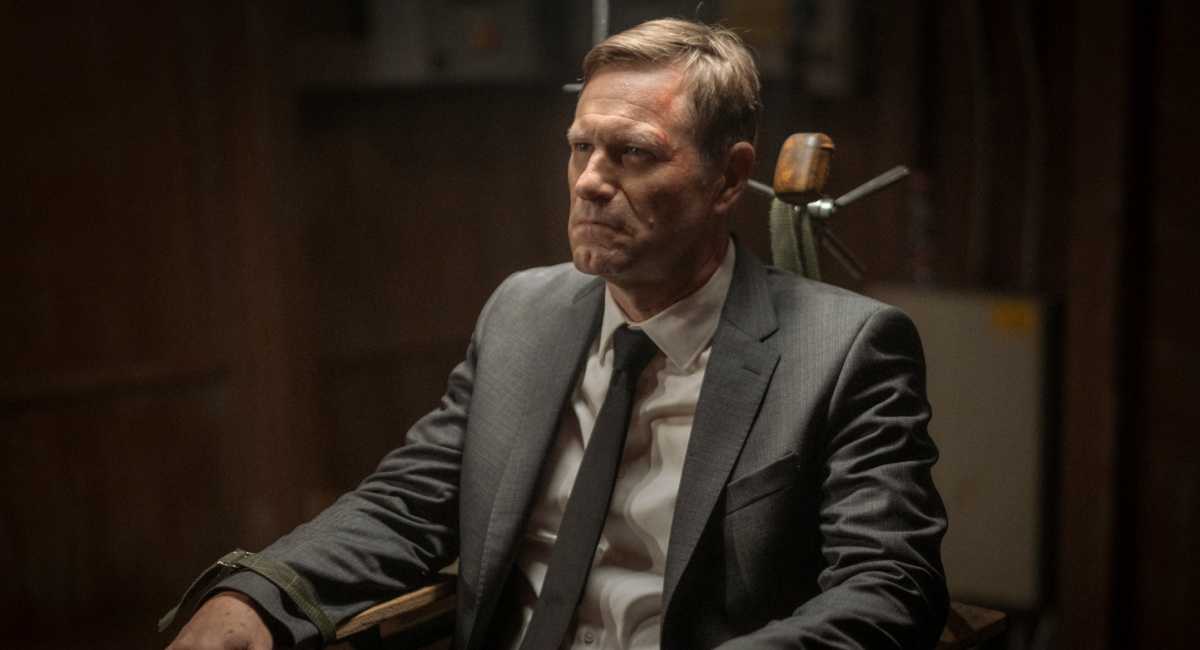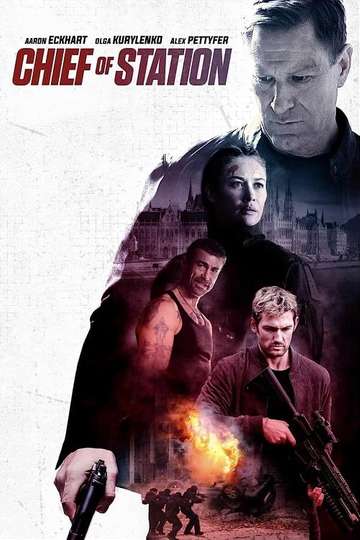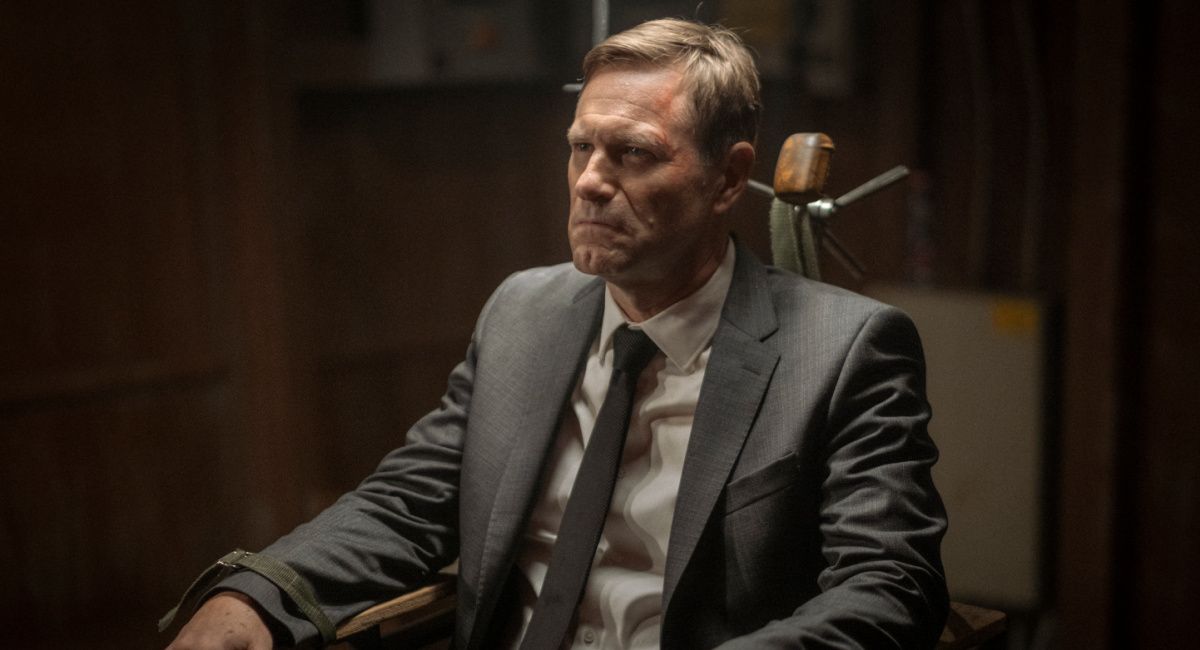
Aaron Eckhart in ‘Chief of Station’. Photo: Vertical Entertainment.
Opening in theaters on May 3rd is the new spy thriller ‘Chief of Station,’ which stars Aaron Eckhart (‘The Dark Knight’), Olga Kurylenko (‘Black Widow’) and Alex Pettyfer (’The Ministry of Ungentlemanly Warfare’).
Moviefone recently had the pleasure of speaking with Aaron Eckhart about his work on ‘Chief of Station,’ his first reaction to the screenplay, his love for the genre, his character, the fight sequences, and working with Olga Kurylenko and Alex Pettyfer, as well as looking back at the making of ‘Sully’ and working with Tom Hanks and Clint Eastwood.
Related Article: ‘Silicon Valley’s Chris Diamantopoulos Talks Action Comedy ‘High Heat’
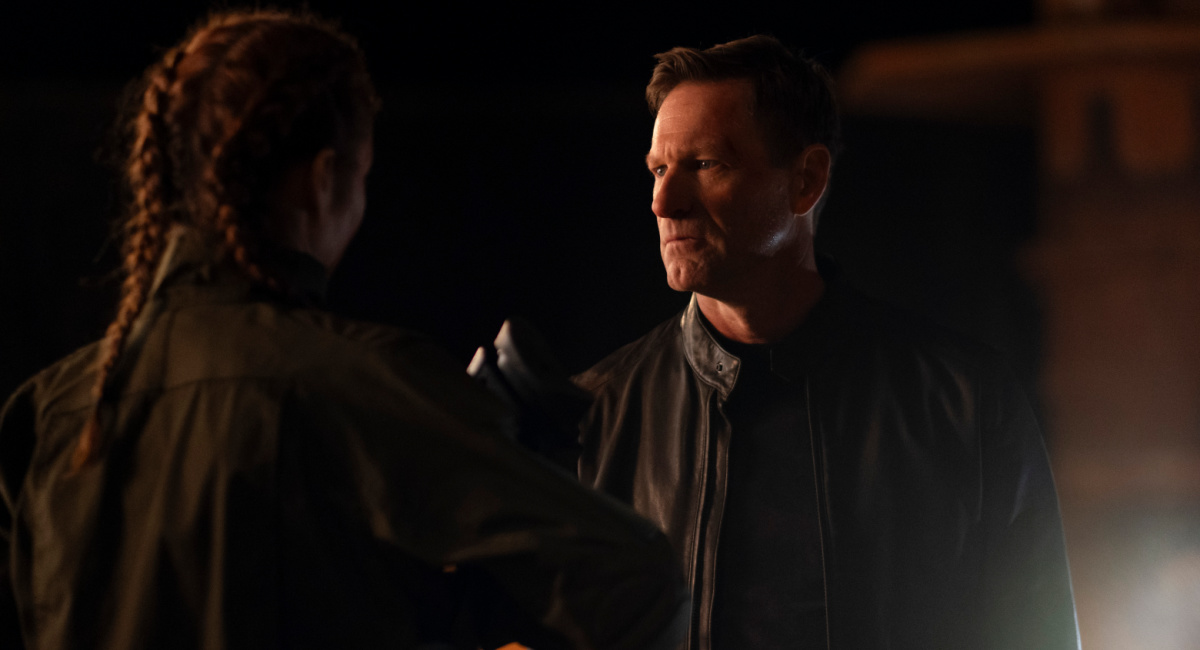
(L to R) Olga Kurylenko and Aaron Eckhart in ‘Chief of Station’. Photo: Vertical Entertainment.
Moviefone: To begin with, can you talk about your first reaction to the screenplay, and in general, when you are reading scripts and choosing projects, what are you looking for?
Aaron Eckhart: Well, it’s interesting. I like the cold war era spy movie. I grew up watching it and it’s always intrigued me. Of course, being in Europe, we filmed this in Hungary, and we used the streets, and we used the architecture and that feeling. I really liked those movies. I like the idea of coordinated events of people moving as one to accomplish a goal and that’s what really the spy game is, isn’t it? It’s sleight of hand and coordination and it’s a house full of mirrors, and I really liked that. I’ve always liked it. I grew up on it, and it’s fun to participate in it.
MF: What are some of your favorite films in the spy thriller genre?
AE: Well, of course there’s ‘Three Days of the Condor,’ which is the iconic film where the powerful guy behind the curtain is on the other end of the phone giving instructions or telling you in the middle of this city of millions of people on a pay phone that he’s got eyes on you. There’s just something that’s so intriguing about that, and especially with today’s technology. Every spy film I can think of is about how they can implant something, how they can monitor you in some way, and what’s more topical than that right now in terms of cameras, drones, the internet, lasers and radar. All this stuff where they can literally see into your mind and even implant things now. So, the idea of this surveillance state and the idea that they know what you’re thinking always is fascinating, especially as they implant chips and that. So, I’ve always been fascinated by that, the idea of it, what’s true and what’s not true, what is the future? What does it look like? I think it’s good fertile ground for filmmaking.
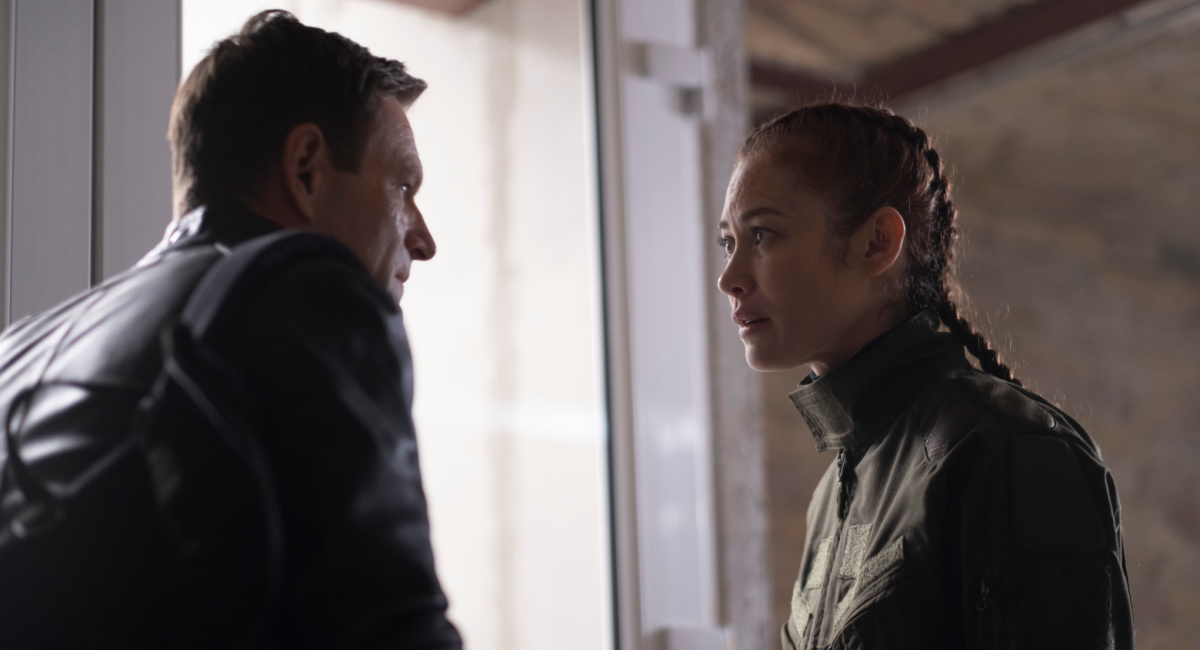
(L to R) Aaron Eckhart and Olga Kurylenko in ‘Chief of Station’. Photo: Vertical Entertainment.
MF: In the movie, your character suffers a great loss. Can you talk about who he was before that event, and who he becomes after?
AE: He loses his wife to a bomb and it’s his fault. It’s the fault of his occupation and her involvement in it. Of course, she’s in it as well but I become the casualty. Before, you’re talking about a man who’s living his life, his occupation, everything, and then you’re talking about deep loss. I mean, there’s not really anything I can say more than that. It’s just, you’re a hollow man. You’re now winding down the days and nothing really feels or tastes the same and that’s where he is at right now. He’s avenging his loss as well and having to deal with the real world as well as the inner world of this darkness that he has.
MF: Can you talk about that guilt and how it affects his relationship with his son?
AE: I mean, his son, it’s interesting being a father. I’m not a father, so I couldn’t say, but I could only imagine the idea of a boy losing his mother to a tragic and terrible event, and then having to find his way through life, especially when you have a dad who is away and is not really in touch with his own feelings. His boy drifts off and gets into places maybe where he shouldn’t be, and he goes through his own dark times. They must reconnect and reform a relationship on a different level now. They’ve gone from father-son to more friends and contemporaries, and they must exist on this level now. It’s an interesting dynamic because in a lot of ways, the father feels like a fraud. He let his son down. He’s responsible for his mother’s death in a way, and he’s got a lot of guilt associated with that.
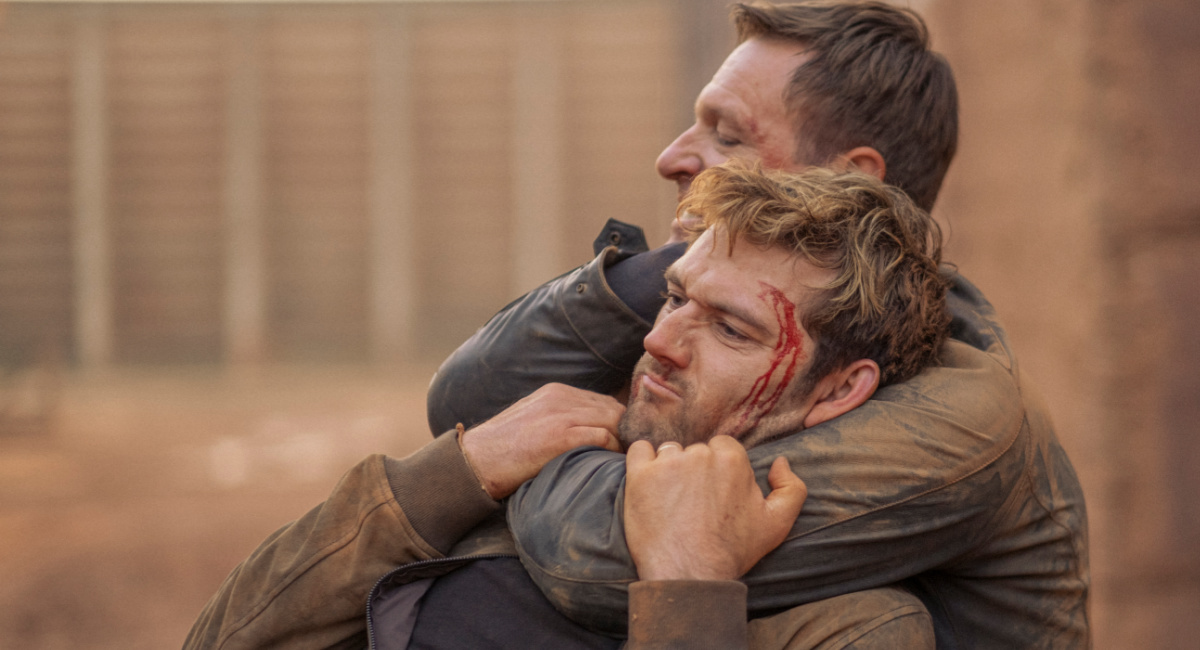
(L to R) Aaron Eckhart and Alex Pettyfer in ‘Chief of Station’. Photo: Vertical Entertainment.
MF: There is a great scene in the movie where you fight one of the bad guys on a boat. Can you talk about shooting that sequence?
AE: First, filming in Hungary and Budapest was just amazing and we were on the river there and we were on a riverboat. It is in the middle of the river, and it’s going up and down. It was just fantastic with this beautiful architecture, European history, and we had a great fight coordinator. (I was fighting) the fight coordinator (in that scene) and he was just a great guy. Basically, we worked out that fight that morning. We got to work and he’s like, “Okay, this is what’s going to happen.” We just rehearsed the fight and worked on it throughout the day because we did have a couple other scenes before that. It’s amazing when you have somebody who’s a fighter that you’re working with because you have total trust that he’s going to do the right thing and that you’re going to do the right thing. We just worked out this fight and he beats the crap out of me and I beat the crap out of him, and it was a great day.
MF: What was it like working with Olga Kurylenko and Alex Pettyfer?
AE: Well, Alex is great. I love him. He’s a great actor and a great guy. I had a lot of fun with him. I did not know him before, but I just really warmed up to him and we had a good time together. I really appreciate him as a person and as an actor. Very impressive. Olga, of course, was awesome. I worked with her before (‘Erased’). Again, she’s very humble and very giving. She’s willing to do anything for the director and for the scene, which I really appreciated, and is a total professional as well and makes it look good all the time. So really between just those two, it made the days easy and fun. Alex and I had our own fight scene that was punishing. Again, he’s a fighter and can throw a punch and knows how to take a punch, and he’s very giving. You never know how those things are going to turn out because you might go home with some bruises. But we had a good time.
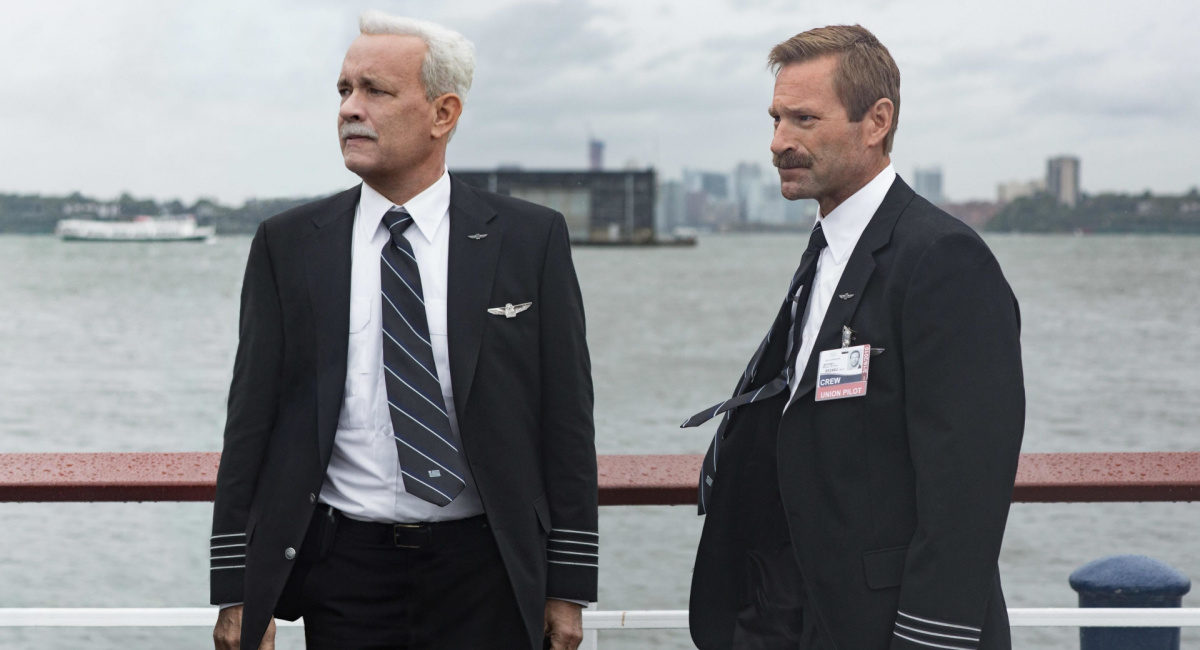
(L to R) Tom Hanks and Aaron Eckhart in director Clint Eastwood’s ‘Sully’. Photo: Warner Bros. Pictures.
MF: Finally, I love ‘Sully’ and think it’s one of Clint Eastwood’s best movies. One of my favorite scenes in the film is when Tom Hanks’ character pulls you into a hallway during the trial sequence and tells your character how proud he is of what you’ve both accomplished and that “We did our job.” Can you talk about shooting that scene with Tom and Clint?
AE: I’m happy to hear that because it’s a small scene and it’s not a very monumental scene, but it’s leading into the auditorium, which is the big monologue. A couple of things. I loved making that movie. I love Clint. I love Tom. I loved working with them. I love how subtle Tom is and how much trust Clint gives the actors. In fact, I remember one time when we were sitting around that big table having a discussion, I can’t remember which scene it was, but Tom was in it, I was in it, and some other people. Between a take or something, I can’t remember, I said something to Clint about doing it the first time or something like that. Clint goes, “That’s why I cast good actors.” The trust level was off the charts. He just let us do whatever we wanted. He never questioned us, never. It was just amazing. Then Tom was the leader. He took charge and coordinated everything either verbally or non-verbally and we all followed. That scene is a perfect example of that, it epitomizes that, where you have the senior guy coming out, taking charge, and going into the auditorium. A little bit of humor in that scene as well, but “a job well done and we’re going to be okay” and that’s what a leader does.
What is the plot of ‘Chief of Station’?
After learning that the death of his wife was not an accident, a former CIA officer and Station Chief (Aaron Eckhart) is forced back into the espionage underworld, teaming up with an adversary (Olga Kurylenko) to unravel a conspiracy that challenges everything he thought he knew.
Who is in the cast of ‘Chief of Station’?
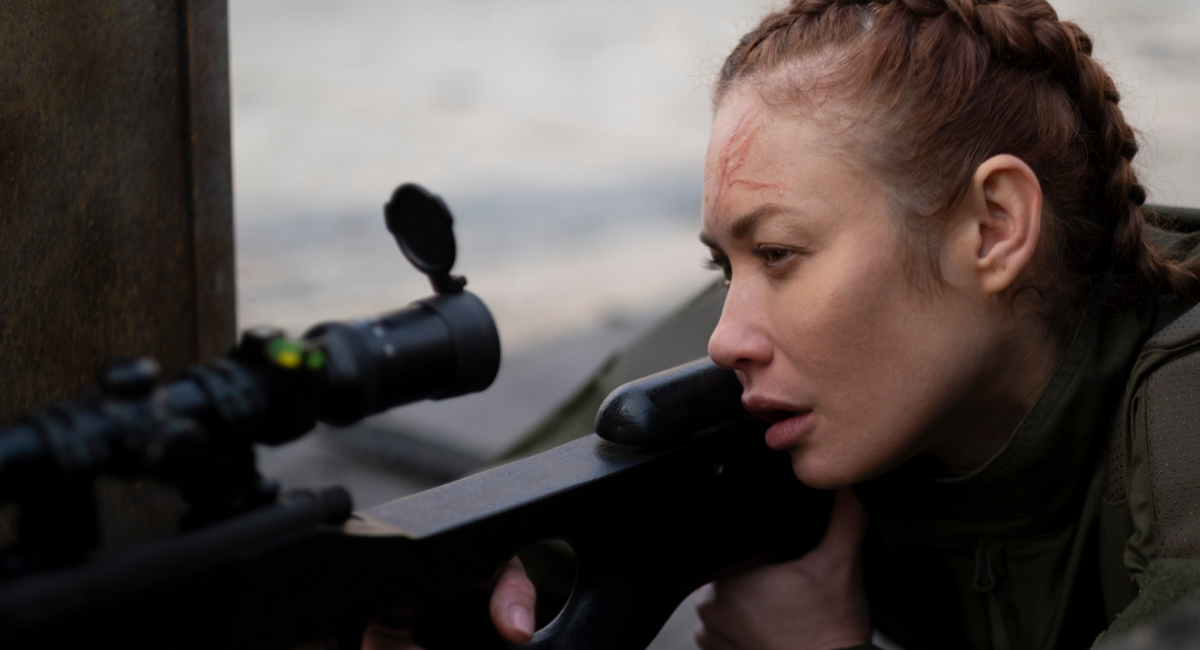
Olga Kurylenko in ‘Chief of Station’. Photo: Vertical Entertainment.
Movies Similar to ‘Chief of Station’:
Buy Aaron Eckhart Movies on Amazon
Read the original article here



